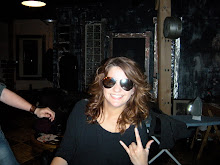There are hundreds of sites that host blogs, and blogspot just happens to be the one that I chose to use to host mine. And before this class, as I have previously mentioned, I did not have a blog, so this was completely new territory for me. However, I have come to notice just how powerful and useful a blog can be. It is a place to vocalize opinions, discuss current events, and generally just let it all out. However, since there are no rules or regulations on what can be posted on the internet, much less a personal blog, there are some people who take advantage of that opportunity. An example of the use, or to some people the abuse, of this privilege happened a few months ago concerning the blog of a political figure in Ontario. He openly published on his blog that he advocated women carrying concealed weapons, because ' if they [women and gays] don't want to be the object of hate crimes, then they should do something to protect themselves.' Needless to say, this candidate removed himself from the runnings during the election and was put under very tight criticism afterwards.
In his book 'Free Culture', Lawrence Lessig illustrates blog culture, and how it is a kind of "public diary...it records private facts in a public way." He also goes further into the development and uses of a blog by saying :
"...blogs have taken on a very different character. There are some who us the space simply to talk about their private life. But there are many others who use the space to engage in public discourse. Discussing matters of public import, criticizing others who are mistaken in their views...offering solutions to the problems we all see: blogs create the sense of a virtual public meeting, but one in which we don't all hope to be there at the same time..."
After reading Lessig's book, I specifically remembered this excerpt, because of the way it related to the exact kind of social networking that we were doing in this class.
Works Cited
Lessig, Lawrence. Free Culture: The Nature and Future of Creativity. London: Penguin Books, 2004.

No comments:
Post a Comment